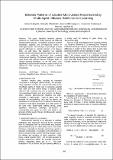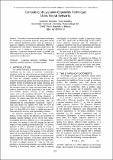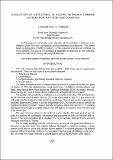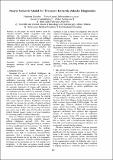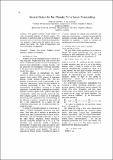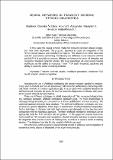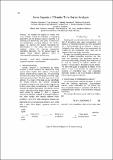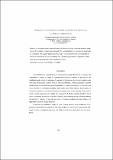Поиск по всему репозиторию:
Просмотр Публикации в изданиях Республики Беларусь по автору "Golovko, Vladimir"
Отображаемые элементы 1-9 из 9
-
Behavior Patterns of adaptive Multi-Joined Robot learned by Multi-Agent Influence Reinforcement Learning
Kabysh, Anton; Golovko, Vladimir; Mikhniayeu, Andrei; Rubanau, Uladzimir; Lipnikas, Arunas (BSUIR, 2011)This paper describes behavior patterns produced by Multi-Joined Robot learned via Influence Reinforcement learning. This learning technique used for distributed, adaptive and self-organizing control in multi-agent system. This technique is quite simple and uses agent’s influences to estimate learning ...2023-10-23
-
Computing of Lyapunov Exponents Techniques Using Neural Networks
Golovko, Vladimir; Savitsky, Yury (BSUIR, 2003)The authors examine neural network techniques for computing of Lyapunov spectrum using observations from unknown dynamical system. Such an approach is based on applying of multilayer perceptron (MLP) for forecasting the next state of dynamical system from the previous one. It allows for evaluating the ...2023-11-17
-
Convergence and integration of artificial neural networks with knowledge bases in next-generation intelligent computer systems
Kovalev, Mikhail; Kroshchanka, Aliaksandr; Golovko, Vladimir (БГУИР, 2022)In the article, an approach to the integration and convergence of artificial neural networks with knowledge bases in next-generation intelligent computer systems through the representation and interpretation of artificial neural networks in a knowledge base is considered. The syntax, denotational, and ...2023-11-02
-
Evolution of detectors in neural network immune system for pattern recognition
Bezobrazov, Sergei; Golovko, Vladimir (БГУ, 2011)In this paper we present the basic principles of the evolution of detectors in intelligent system for pattern recognition, such as malicious code detection. This system based on integration of both Al methods: artificial neural networks and artificial immune systems. The goal of the evolution is ...2023-11-20
-
Neural Network Model for Transient Ischemic Attacks Diagnostics
Golovko, Vladimir; Apanel, Elena; Mastykin, Alexander; Vaitsekhovich, Henadzi; Evstigneev, Victor (BSUIR, 2011)In this paper the neural network model for transient ischemic attacks recognition have been addressed. The proposed approach is based on integration of the NPCA neural network and multilayer perceptron. The dataset from clinic have been used for experiments performing. Combining two different neural ...2023-11-20
-
Neural Networks for Chaotic Time Series Forecasting
Golovko, Vladimir; Savitsky, Yury (BSUIR, 2001)This paper examines neural network in order to predict behavior o f chaotic systems. The prediction is performed both on the level o f emergent structures and on the level o f individual data points. The network is tested using the Henon and Lorenz chaotic time series. The results o f experiments and ...2023-11-16
-
Neural networks in transient ischemic attacks diagnostics
Golovko, Vladimir; Apanel, Elena; Mastykin, Alexander; Vaitsekhovich, Henadzi (БГУ, 2011)In this paper the neural network model for transient ischemic attacks recognition have been addressed. The proposed approach is based on integration of the NPCA neural network and multilayer perceptron. The dataset from clinic have been used for experiments performing. Combining two different neural ...2023-11-20
-
Some Aspects of Chaotic Time Series Analysis
Golovko, Vladimir; Savitsky, Yury; Maniakov, Nikolaj; Rubanov, Vladimir (BSUIR, 2001)We address two aspects in chaotic time series analysis, namely the definition of embedding parameters and the largest Lyapunov exponent. It is necessary for performing state space reconstruction and identification of chaotic behavior. For the first aspect, we examine the mutual information for ...2023-11-16
-
Training of the recurrent neural networks for prediction
Savitsky, Jury; Golovko, Vladimir (BSUIR, 1999)In this paper the technique of creation of effective methods of training recurrent neural network for prediction problems are discussed. The various functions of activation of neural units are considered. The adaptive algorithms of training of neural networks with varied functions of activation of ...2023-11-15
